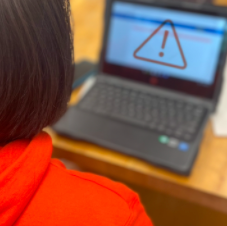Schoology causes unnecessary difficulties for students, teachers
Midtown’s decision to use a new online learning platform, Schoology, has been met by a host of technical problems and frustration from students and teachers.
August 26, 2021
As many students returned to in-person schooling for the first time in over a year, normalcy was something to look forward to. However, Midtown decided that now, during this already tumultuous transition, is the ideal time to make unnecessary changes.
The school replaced the online learning platform students have been using for the entirety of virtual learning, Google Classroom, with a flawed alternative, Schoology. This only created additional difficulties for students and teachers as they came back to in-person school.
Issues with Schoology began immediately, as many students’ introductions to the new platform were hampered by their inability to log in. Student and teacher frustration continued as difficulties logging in persisted throughout the first week. The school has worked to address the issue and came to a solution by providing each student with personal login information. Nevertheless, first impressions with the online learning platform have been hard to shake.
The problems with Schoology continue into the platform itself. The user interface is dated and difficult to navigate, especially in comparison to Google Classroom’s intuitive layout. Managing assignments is unnecessarily confusing, as assignments appear in students’ list of upcoming assignments even after being submitted. If a teacher by-mistake posts a lecture as an assignment and the student doesn’t complete it, the assignment perpetually stays in the student’s to-do list. New materials posted by teachers appear at the bottom of the course page or folder, meaning that keeping up to date with new materials and assignments will only become harder as the school year progresses.
Some of the difficulties with accessibility can be attributed to the additional features and capabilities that Schoology boasts, including a more comprehensive grade report, additional assignment types and greater integration with other learning tools. While these supposed advantages aim to make it a more complete learning management system, many teachers have ignored these features and instead opted to stick with the learning tools they previously used in conjunction with assignments on Google Classroom. This is not surprising since some teachers expressed dissatisfaction with the amount of time given to learn the intricacies of Schoology, although training was offered in some form during the spring and summer.
This is not a problem in itself, but it begs the question of why the school is paying for a more comprehensive online learning platform while using it in the same manner as the tried and true one that was previously in use. Currently, Midtown is the only school in the district using Schoology as its main learning platform, meaning the school has independently decided to spend thousands of dollars on this new platform. However, as students and teachers continue to favor Google Classroom, justifying the cost of Schoology becomes more difficult.
Ultimately, the school has failed to consider the most important value of the previous online learning platform in their decision to switch to Schoology, which is familiarity. Google Classroom was used as part of lessons when school was previously in-person and its usage only increased when students and teachers transitioned to virtual learning. Many current students had never been into the school buildings before the start of this school year, but while their knowledge and experience of the in-person schooling experience was limited, the virtual learning time period afforded them plenty of knowledge and experience using Google Classroom.
A return to in-person schooling that maintained the use of this familiar learning platform would have made the move easier for students and teachers who have been using the platform extensively during virtual learning. Instead, the school was tempted by the underutilized additional features that Schoology has to offer, and neglected to factor in the value of students and teachers’ familiarity with the previous system.
While the rollout of Schoology has been hampered by technical problems, the school has tried to address some of the difficulties students and teachers have experienced. Midtown has worked to solve students’ issues accessing the platform, and after three different changes to student login information, the school came to a solution. Given more time, Schoology could turn out to be a valuable part of the in-person schooling experience. However, the untimely decision to replace the previous online learning platform in favor of Schoology has thus far only left students and teachers frustrated during a delicate transition for the school.
Correction: In an earlier version of the comment, the following was corrected from “teachers had only a week to be trained on the intricacies of Schoology before the start of the school year” to “some teachers expressed dissatisfaction with the amount of time given to learn the intricacies of Schoology, although training was offered in some form during the spring and summer.” The Southerner regrets this error.










